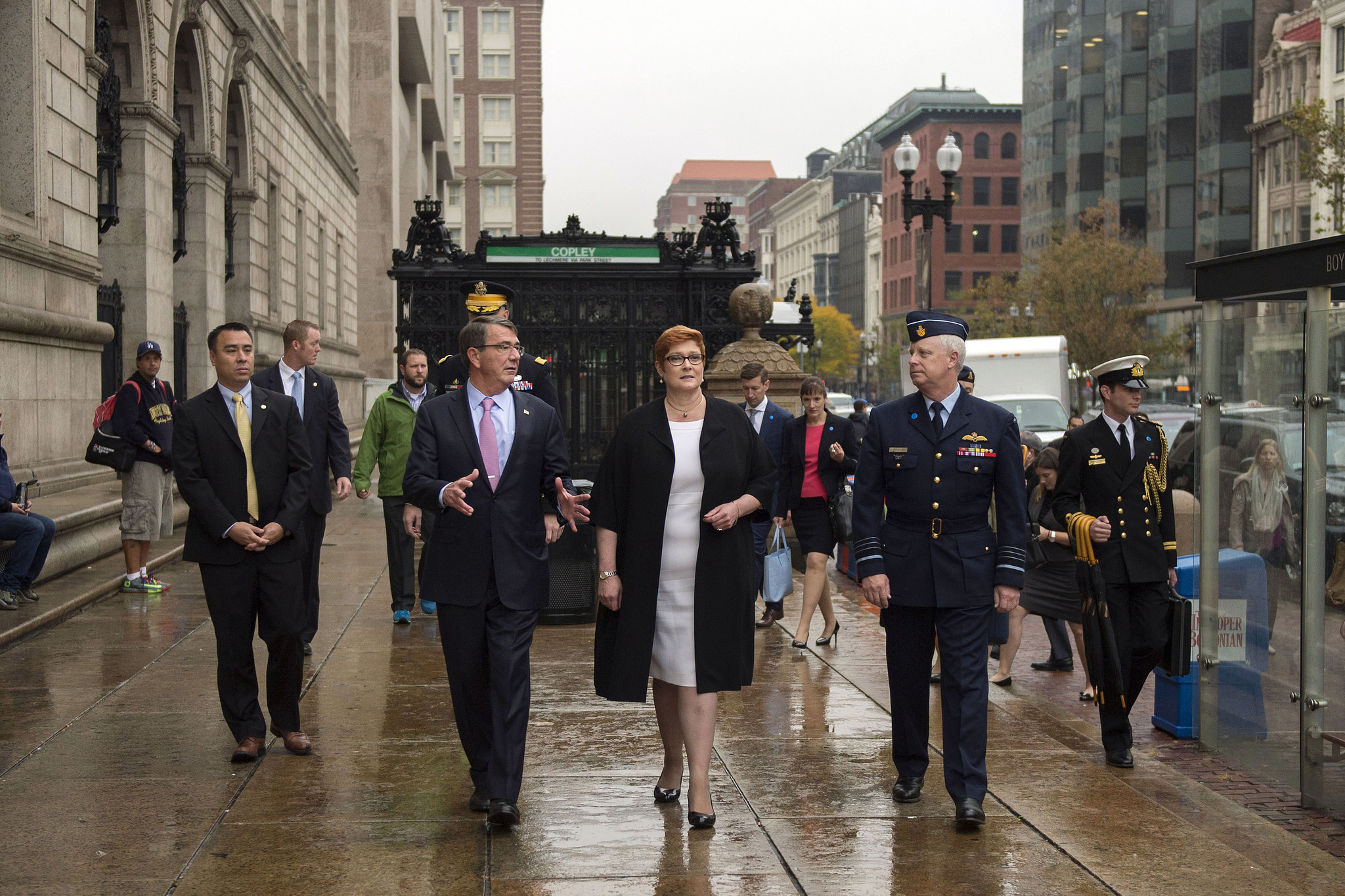By Lisa Ferdinando DoD News, Defense Media Activity
WASHINGTON, October 13, 2015 — Australia is a strong partner
to the United States and is making valuable contributions to peace and security
around the world, Defense Secretary Ash Carter said in Boston today.
"Our alliance remains strong, its reach is global, and
our nations remain a cornerstone of peace and prosperity in the Asia-Pacific
and in the world," Carter said after two days of discussions for the 2015
Australia-U.S. ministerial consultations.
Carter co-hosted the talks in Boston with Secretary of State
John Kerry.
The United States and Australia face a full spectrum of
complex threats, Carter said, citing as examples illegal trafficking,
cybersecurity and the threat posed by the Islamic State of Iraq and the Levant
and violent extremism.
Australia has been with the United States since the start in
Afghanistan, and has expanded its critical role in Iraq and Syria to
"deliver ISIL a lasting defeat," Carter said, noting that Australian
pilots have recently begun flying in Syria.
This year marks the 75th anniversary of diplomatic relations
between the United States and Australia, Kerry said.
"Good friends are vital all the time, but they are
especially welcome in turbulent, challenging times," the top U.S. diplomat
said. "That is why the United States' partnership with Australia is so
important."
Carter and Kerry spoke in a news conference with the
visiting Australian dignitaries, Foreign Minister Julie Bishop and Defense
Minister Marise Payne.
U.S., Russia to Discuss Air Safety Protocols
"Our counter-ISIL fight will proceed unchanged, as we
continue to urge Russia to change its failing strategy," Carter said.
Russia must act professionally in the skies over Syria and
abide by basic safety procedures, he said. U.S. and Russian officials will have
another conversation on the topic tomorrow, he added. In a statement after the
news conference, Pentagon Press Secretary Peter Cook said U.S. defense
officials will hold a third secure video conference tomorrow with Russian
Defense Ministry officials. "The focus of these discussions is on specific
safety protocols for aircrews flying over Syria. Those discussions are
progressing, but nothing has been finalized," Cook said.
"Even as we continue to disagree on Syria policy, we
should be able to at least agree on making sure our airmen are as safe as
possible," Carter said at the news conference.
The Syrian crisis requires a political solution, Kerry said.
"A military component can help you get to that solution,” he added, “but
Syria is literally being destroyed in the process."
Deepening the Alliance
Carter said he and Payne signed a bilateral statement on
defense cooperation that includes increased intelligence sharing, improving
multilateral and defense industry engagement, and fine-tuning interoperability.
The foundation of the U.S.-Australia relationship is built
on values of freedom, democracy and rules-based order, Carter said.
"Today, by deepening our alliance, we renew those values and stand
resolved to defend them together," he added.
Since 2013, the U.S. rotational force near Darwin has
expanded more than five-fold to 1,150 Marines, he said. "Australia and
America both want to sustain and renew an Asia-Pacific regional security
architecture where everyone rises and everyone prospers," Carter said.
"That's the essence of the U.S. rebalance toward the region."
Tensions in South China Sea
The United States and Australia share an interest in
upholding basic international norms such as freedom of navigation and the free
flow of commerce, Carter said.
"Together, our nations favor peaceful resolutions to
disputes and oppose coercion and infringement on well-established international
norms, especially in the face of rising tensions in the East and South China
Sea," he said.
The United States will continue to "fly, sail and
operate" wherever international law allows, explaining that, the
"South China Sea is not and will not be an exception."
Anchoring Regional Stability
"The United States stands ready to continue our role as
a pivotal security partner in this region, as we have done for over 70
years," Carter said. The strong U.S.-Australia defense partnership will
continue to "anchor regional stability and strengthen our capacity in a
variety of other areas, including disaster relief, and response to humanitarian
crises," he added.








No comments:
Post a Comment